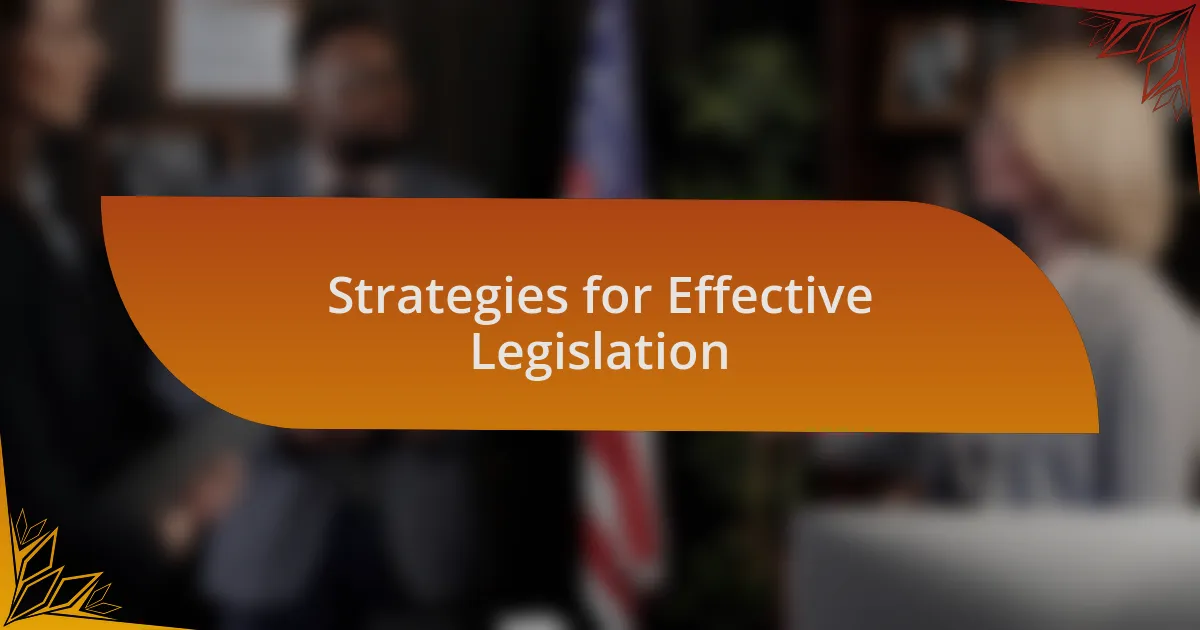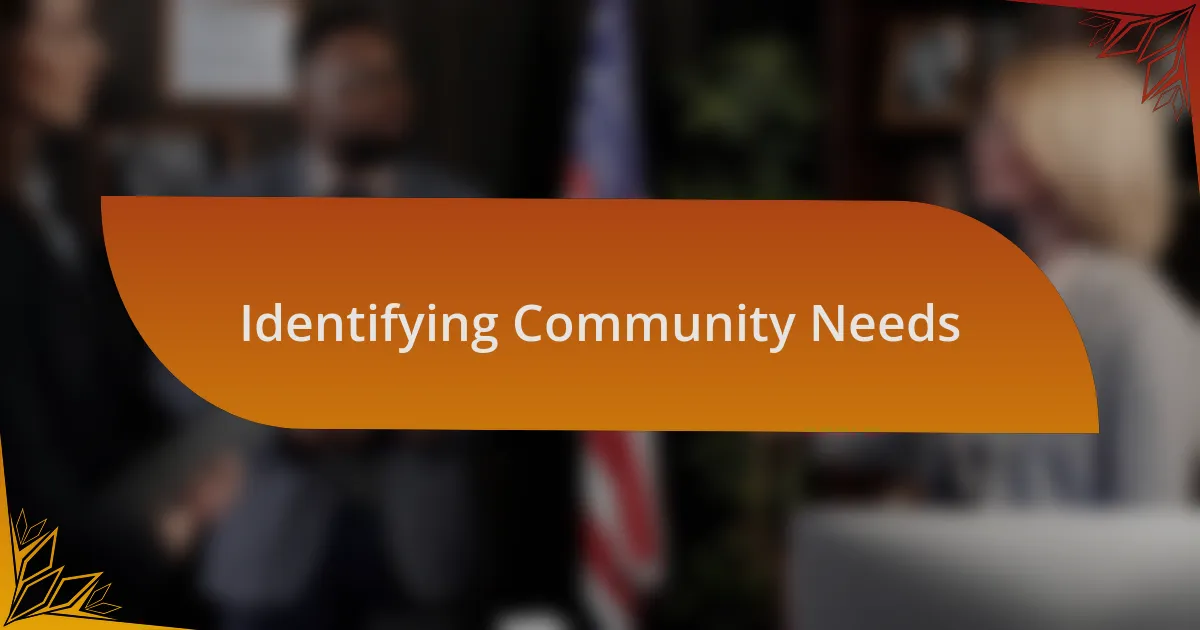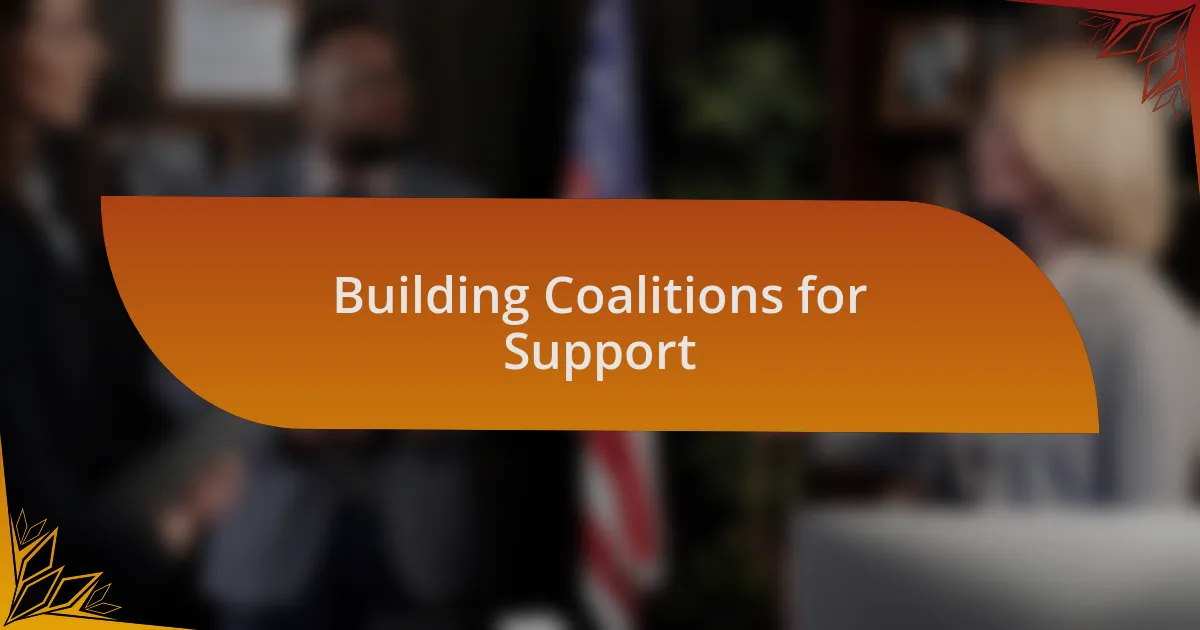Key takeaways:
- Reparations politics is deeply connected to historical injustices and requires community engagement to shape meaningful policies.
- Building coalitions among diverse community groups and leveraging personal stories can amplify advocacy efforts for reparations.
- Identifying community needs through conversations and surveys ensures that legislative efforts address real, pressing issues.
- Tracking progress and outcomes of advocacy initiatives fosters transparency and strengthens community investment in the reparations movement.

Understanding Reparations Politics
Reparations politics is rooted in the historical injustices faced by marginalized communities, particularly African Americans, due to systemic racism and disenfranchisement. I remember attending a community meeting where stories of generational trauma poured out from people’s hearts. It struck me how deeply these experiences are intertwined with the call for reparations—can we really move forward without acknowledging the past?
The discourse around reparations is often nuanced, involving moral, economic, and social dimensions. When I first engaged with this topic, I found myself grappling with questions like, “What does justice really look like?” and “How can we balance the scales for those who have been wronged?” These questions are not just theoretical; they resonate with the lived realities of individuals who have faced discrimination on multiple levels.
Engaging with reparations politics also means understanding the varying perspectives within the community. Some advocate for direct payments, while others stress the need for systemic changes. During a local forum, I listened to a passionate discussion about reparative education and housing initiatives that could uplift entire communities. This ongoing conversation reflects a broader struggle for equity—one that requires us all to participate and listen intently.

Importance of Community Engagement
Engaging the community in the conversation around reparations is vital for several reasons. I remember walking through my neighborhood while handing out flyers for a local discussion. The conversations that emerged were rich, filled with passion and diverse viewpoints; it reminded me how essential it is for community members to have a voice in shaping policies that directly impact their lives.
Community engagement fosters a sense of ownership over the issue of reparations. During a roundtable discussion, I observed how individuals shared their insights, realizing that their stories, though unique, painted a collective picture of resilience and demand for justice. When people see that their contributions matter, it transforms apathy into active involvement—how powerful is that shift?
Furthermore, engaging the community creates a platform for education and awareness. I recall a workshop where an elder shared her family’s history of discrimination, prompting younger attendees to reflect on their own experiences. This exchange wasn’t just informative; it was transformative, showing just how crucial it is for us to learn from one another and cultivate a unified front in advocating for reparative justice.

Strategies for Effective Legislation
One effective strategy for legislation is to cultivate coalitions among diverse community groups. I remember organizing a meeting that brought together activists, local leaders, and even skeptics. The magic happened when we all sat down to listen to each other; it was clear that by uniting our strengths, we could create a more compelling narrative for reparations. Have you ever noticed how collaboration amplifies voices that might otherwise go unheard?
Another vital approach is leveraging storytelling to make legislative proposals more relatable. I’ve found that when community members share their personal experiences, it transforms dry legal jargon into a compelling call for action. At one gathering, a participant spoke about how her grandmother’s struggles shaped her family’s legacy. It was a poignant reminder that behind every statistic lies a human story, urging lawmakers to see the real impact of their decisions.
Finally, staying persistent in communication with legislators can greatly enhance the chances of passing effective legislation. I once penned a series of heartfelt letters to my representatives, sharing insight from community dialogues. Each response I received varied in tone, but the consistent theme was an acknowledgment of the community’s demands. It reinforced my belief that continued engagement keeps the conversation alive—how often do we realize that simply putting pen to paper can influence change?

Identifying Community Needs
Identifying community needs is an essential first step in shaping effective legislation. During my initial outreach efforts, I sat in community centers and coffee shops, listening to residents express their concerns. It struck me how often people felt invisible, as though their experiences were lost in the noise of broader discussions. Isn’t it fascinating how powerful a simple conversation can be in uncovering real issues?
In one instance, I facilitated a focus group where we created a safe space for sharing. Many participants opened up about issues like housing instability and access to healthcare, themes that hadn’t been adequately addressed in previous dialogues about reparations. I felt their frustration; it illuminated the mismatch between their lived experiences and the legislative priorities. How do we ensure these voices are not just heard, but deeply considered?
Moreover, engaging with community surveys helped me develop a clearer picture of prioritized needs. I remember pouring over the responses, realizing that many felt disconnected from the political process. It was a wake-up call for me. If we want to frame effective reparations legislation, we need to ground it in the real, pressing needs of the communities we aim to serve—how else can we ensure that our efforts truly resonate?

Building Coalitions for Support
Building coalitions requires intentional and strategic collaboration. I vividly recall the day I organized a community meeting where local leaders and residents gathered for a common cause. As we shared our goals, I couldn’t help but notice the palpable energy in the room—people were eager to connect and strategize. Wasn’t it remarkable how different organizations, often working in silos, discovered overlapping interests that day?
In these coalition-building efforts, I found it’s essential to establish trust among all parties involved. I once spent an afternoon attending various grassroots events across the city, learning about the unique missions of these groups. It was enlightening to see how passionately each representative spoke about their cause, and I realized that shared values could serve as a powerful foundation. How could we harness that enthusiasm to advocate collectively for reparations?
As discussions evolved, I found that transparency was crucial in fostering collaboration. I remember drafting a joint statement that highlighted our united stance on reparations, but not without incorporating feedback from every group. This process not only empowered everyone involved but deepened our commitment to the cause. What if we had ignored their voices? I believe that this inclusion was the key to galvanizing support from a diverse constituency.

Sharing Personal Stories
Sharing personal stories has become a cornerstone of my advocacy work. I remember a powerful moment at a town hall meeting when a resident stood up to share her family’s history, detailing the generational impact of systemic injustices. As she spoke, I could see tears in the eyes of many in the audience. It struck me how sharing our personal narratives not only illuminates the struggles we face but also fosters a deeper connection among community members. Have you ever experienced that kind of vulnerability in a public space?
In another instance, I took part in a storytelling workshop designed to empower participants to articulate their experiences with reparations. The emotional weight in the room was palpable. One participant recounted how their ancestors had fought for rights that they themselves could barely grasp. Listening to that story reminded me that personal narratives hold immense power—they can ignite passion and spur action in ways statistics simply cannot. Isn’t it fascinating how a single story can resonate deeply and motivate collective action?
I’ve also found that these shared experiences often lead to unexpected friendships. After facilitating a community storytelling event, several attendees reached out to collaborate on future initiatives. It was in those follow-up conversations that I realized the profound bond that personal stories can create. How many connections have you made through a simple act of sharing your truth?
![]()
Tracking Progress and Outcomes
Tracking the progress of our legislative efforts requires a thoughtful approach. I remember a community meeting where we discussed metrics to evaluate our impact—everything from the number of supportive emails sent to local representatives to the attendance at advocacy events. Each metric served as a powerful reminder of our collective voice; it was exciting to see tangible proof that our community’s involvement was making a difference. Have you ever noticed how milestones can energize a group?
Equally important are the outcomes of these initiatives. During a recent follow-up session, we analyzed how proposed legislation had evolved since our engagement began. Hearing testimonials from community members who felt empowered to speak up was incredibly rewarding. It made me think: what would happen if more people understood the importance of tracking these outcomes? The connection between our advocacy and actual change is often clearer when we take the time to reflect.
Moreover, I’ve learned that transparency is key in this process. Sharing progress reports with the community helped many feel invested in our journey. I recall one particular report where we highlighted both successes and challenges, inviting open dialogue. It made me realize that even setbacks can be valuable teaching moments—what can we learn from those stumbles? Engaging openly creates a culture of trust, essential for mobilizing sustained support for our cause.